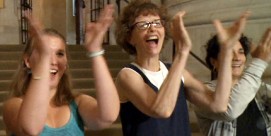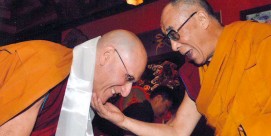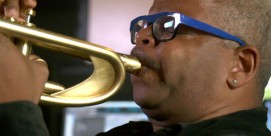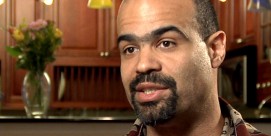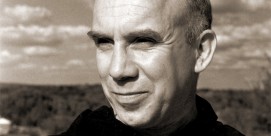In This Episode << SLIDE LEFT TO SEE ADDITIONAL SEGMENTS
Faith and the Brain
BOB ABERNETHY, anchor: Scientists have long found an association between relaxation and health. Now, there is new evidence that meditation and other spiritual practices have a beneficial and measurable effect on the brain. In a new book, “How God Changes Your Brain,” Andrew Newberg reports that meditation improves memory and reduces stress and that the kind of God you worship can affect the structure of your brain. Lucky Severson has the story.
VINCENT FEDOR (meditating and reciting mantra): Sa, ta, na, ma…
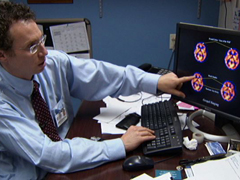 LUCKY SEVERSON: As unlikely as it may seem, Vincent Fedor is practicing meditation.
LUCKY SEVERSON: As unlikely as it may seem, Vincent Fedor is practicing meditation.
VINCENT FEDOR: …and you go into the whisper sa, ta, na, ma…
SEVERSON: Vincent and his wife, Judy, started meditation after they answered a questionnaire about improving their memory. That was one objective of Dr. Andrew Newberg. The other was that he wanted to scan their brains while they did it. Here are Vincent’s scans before he learned to meditate and after he had been doing it for eight weeks.
DR. ANDREW NEWBERG (University of Pennsylvania, with brain scans): Okay, so it is asymmetric, more active here than here, and after meditation it’s more active here than here. So simply doing the practice of the meditation he has altered the activity in this very, very important part of the brain, and this is really important, because this means he has changed the way his brain is working.
SEVERSON: Since meditating Vincent feels he’s become a better high school track coach.
VINCENT FEDOR: I think I’ve become a calmer, more tolerant person. If the situation comes up I don’t go to the angry side. I go take the calmer road. And you know, I think the kids see this. I think I’ve become a better coach because of it.
NEWBERG: It makes sense that if by doing this practice he has increased the activity in that frontal lobe, he’s actually able to improve the way in which he monitors his emotional responses to people and perhaps can treat them with more compassion.
SEVERSON: Dr. Newberg has studied nuns who do repetitive prayer, and he has seen the same kind of results. He’s been studying the effects of meditation and prayer on the brain for several years and is considered one of the leading experts in a new field called neurotheology.
 DR. NEWBERG: We’ve learned that being religious or spiritual has a very profound effect on who we are, has a very profound effect on our biology and on our brain, and what we’ve found more recently is that not only does it have a profound influence on who we are, but it actually can change our brain and to change ourselves over times.
DR. NEWBERG: We’ve learned that being religious or spiritual has a very profound effect on who we are, has a very profound effect on our biology and on our brain, and what we’ve found more recently is that not only does it have a profound influence on who we are, but it actually can change our brain and to change ourselves over times.
SEVERSON: Here at the University of Pennsylvania Center for Spirituality and the Mind, images of the brain are taken during or after a person prays or meditates.
Dr. NEWBERG: The more you use a part of the brain the more blood flow it gets and the brighter or more red it looks on the scans.
SEVERSON: Over the years Dr. Newberg has adapted a 12-step mediation exercise that includes sound, movement, and breathing.
JUDY FEDOR: Sa, ta, na, ma. The first two minutes the mantra is sung. The second two minutes the mantra is whispered. The third sequence is silence, back into the whisper and finishing with the song. After that it’s deep breathing, holding in, that’s done three times, body relaxes, and the mantra is completed.
The minute I can start doing it and moving my fingers my body gets calmer. It’s very soothing. To me it gets almost in a passive mode, and then you have energy afterwards because you became so calm.
Dr. NEWBERG: Religion and spirituality do help to lower a person’s feelings of depression, anxiety, gives them some meaning in life, helps them to cope with things, and that’s going to have a potentially very beneficial effect.
SEVERSON: But Newberg has made another discovery, a controversial one, that our belief system, how we view God, can make a huge difference in how it affects our well being. If we believe in a loving God it can have a positive effect, even prolong our lives. But believing in a judgmental, authoritarian God can produce fear, anger, and stress, and that’s not healthy.
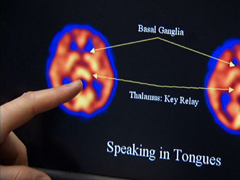 Dr. NEWBERG: When it ultimately turns towards hatred, and whether it’s people who believe in abortion versus those who don’t, whether it’s just one religion versus another, when you hear rhetoric which is hateful, filled with anger, that turns on the different parts of the brain that are involved in our stress response and our anger response.
Dr. NEWBERG: When it ultimately turns towards hatred, and whether it’s people who believe in abortion versus those who don’t, whether it’s just one religion versus another, when you hear rhetoric which is hateful, filled with anger, that turns on the different parts of the brain that are involved in our stress response and our anger response.
SEVERSON: George Handzo is a chaplain with the Healthcare Chaplaincy of New York City. He says Newberg’s conclusions, that a person’s belief in a certain kind of God can be unhealthy, is bound to be controversial among people of faith.
CHAPLAIN GEORGE HANDZO (Healthcare Chaplaincy of NYC): They’re saying that there is one word of God, and God commands us to follow that word, and if we want to save people from God’s anger and condemnation we’re obliged to get other people to believe as we do
Dr. NEWBERG: I’m not arguing that people need to change their beliefs per se. I mean if they feel that their perspective on God is right, I mean then that’s terrific. But I think that what we have to all be careful about is the anger and the hatred. That’s what has detrimental effects both on the individual as well as on society as a whole.
SEVERSON: Skeptics of Newberg’s work question if science should be delving into religion and spirituality in the first place, and they ask if his research has actually proven much of anything.
HANDZO: Faith is, by definition, reliance on things you cannot see and cannot know. Faith is something we believe God gives to us. It’s not something we invent. As a person of faith, this whole debate about what is going to be knowable is not a particularly interesting question to me.
Dr. NEWBERG: You know, if we get a brain scan of somebody while they’re experiencing being in God’s presence, as I’ve always said, that doesn’t prove that God was in the room. It doesn’t prove that God wasn’t in the room. What it proves is that when the person had the experience of interacting with God this is what change was going on in their brain.
 DONNA MORGAN: Can I just praise the Lord right now? I feel like if I don’t praise the Lord I’m going to bust…Thank you Jesus. Thank you Jesus…
DONNA MORGAN: Can I just praise the Lord right now? I feel like if I don’t praise the Lord I’m going to bust…Thank you Jesus. Thank you Jesus…
SEVERSON: Dr. Newberg has found there are some religious practices where the person is intensely focused and others where they just allow themselves to be taken over, for example, speaking in tongues. Dr. Newberg has scanned the brains of people of all belief systems, of people with no faith, and those of deep conviction, like Donna Morgan, who is a Pentecostal.
DONNA MORGAN: When are you in that realm of praise you just give over to the Holy Spirit. Then you let him take control, and when he’s taking control, right, you can speak in tongues, if you’ve been given that gift.
Dr. NEWBERG (with brain scans): Speaking in tongues you’re going to see that the frontal lobes are going to decrease in activity. So that means the frontal lobes, the part of the brain that normally makes them feel like they are in control of what they are doing, is shutting down.
SEVERSON (to Dr. Newberg): It is shutting down because…
Dr. NEWBERG: It is consistent with the feeling that they are not in charge of the process.
SEVERSON: There are some who argue that certain people are predisposed or hard-wired toward transcendent experiences, and some are not. It’s an argument Chaplain Handzo disagrees with.
HANDZO: I don’t believe in a God that creates people, especially selectively, in a way that makes it difficult for them to access this God. That’s not my God.
Dr. NEWBERG: I think to some degree we all are hard-wired to be able to think about things on these levels. It’s just a matter of how much we engage that and if we find a path that does help us to engage that for ourselves.
SEVERSON: Newberg says people of faith shouldn’t worry that his research will ever diminish their faith.
Dr. NEWBERG: I don’t think that our science is going to be able to definitively prove that God exists or doesn’t exist. It is, ultimately, a leap of faith.
SEVERSON: Newberg believes the number one activity that can exercise your brain and enrich your life is faith.
Dr. NEWBERG: When you have those kind of positive, optimistic beliefs in the world, in God or religion, depending on the person, that that really, over the long haul, seems to be the thing that really provides a benefit for us in terms our mental state and in terms of our physical health and well-being.
SEVERSON: As for his own faith, he describes himself as a searcher who is still searching. For Religion & Ethics NewsWeekly, I’m Lucky Severson in Philadelphia.

